Between 1956 and 1967, groundnut was one of Nigeria’s most valuable export crops. There were groundnut pyramids in Kano by 1960; Nigeria was the world’s largest exporter of shelled groundnuts, with a 40% global market share.
Today, Nigeria has a 0% market share. Specifically, groundnut exports fell from 502,000 tons in 1961 to 291.000 tons in 1970 to zero by 1980.
Why did the groundnut pyramid disappear from Nigeria? Sure there was the Aflatoxin contamination that affected the groundnut exports. Why could the Northern region not just fumigate and fix the contamination? Why did it just allow exports of this cash crop to cease?
The story is similar in Palm Oil. In the year 2020, Indonesia made $18.45 billion from exporting palm oil. This is more than the entire 2020 budgets of the states in the South-East, South-South, Lagos, and Ondo combined. A Center for International Forestry research paper dated 2017 and titled “A short history of palm oil in Indonesia,” authored by Alice Baudoin, Pierre-Marie Bosc, Cécile Bessou, and Patrice Levang, states “the African oil palm, Elæis guineensis, originates from West and Central Africa. The first seeds of the oil palm were brought from West Africa by the Dutch and planted in the Bogor Botanical Garden (Java Island) Indonesia in 1848 (Wahid et al. 2004)”.
In 1832, 75% of the global palm oil export came from Nigeria. Between 1961 and 1965, world oil palm production was 1.5 million tons, with Nigeria accounting for 43% of that production. According to a report by PWC, Nigeria ranks behind Malaysia and Indonesia in palm oil output, accounting for less than 2% of the total global market production of 74.08million MT. See Figure 1. They are also crude oil-producing nations; they have crude oil.
Figure 1. Top Palm Oil Producing Countries
Why has agriculture collapsed? Well, everyone says crude oil, but that’s a bit simplistic; why didn’t exports of Palm Oil and Groundnut expand when crude oil prices fell? From 1960 to 1973, crude oil prices were sold below $3 a barrel; see Figure 2 showing crude oil prices. Why did Nigeria not return to exports of palm oil?
Figure 2: Crude oil prices
Figure 3 shows Nigerian crude oil revenues and share of total revenues based on a research paper by Anthony E Akinlo of the Obafemi Awolowo University in 2012. From 1960 to 1970, we can see that crude oil revenues did go up, but to only 26.3% of total revenues.
Figure 3: Share of oil revenues to total revenues
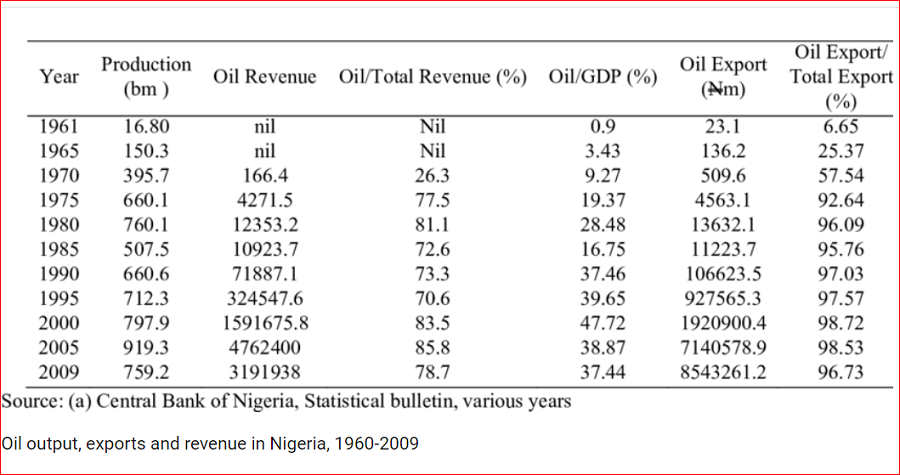 In the same decade, palm oil saw a steep decline in production and exports from Nigeria; See Figure 4, a presentation by the Federal Ministry of Agriculture and Rural Development showing a decrease in palm oil output.
In the same decade, palm oil saw a steep decline in production and exports from Nigeria; See Figure 4, a presentation by the Federal Ministry of Agriculture and Rural Development showing a decrease in palm oil output.
Fig 4: Nigeria Palm Oil Exports Fall
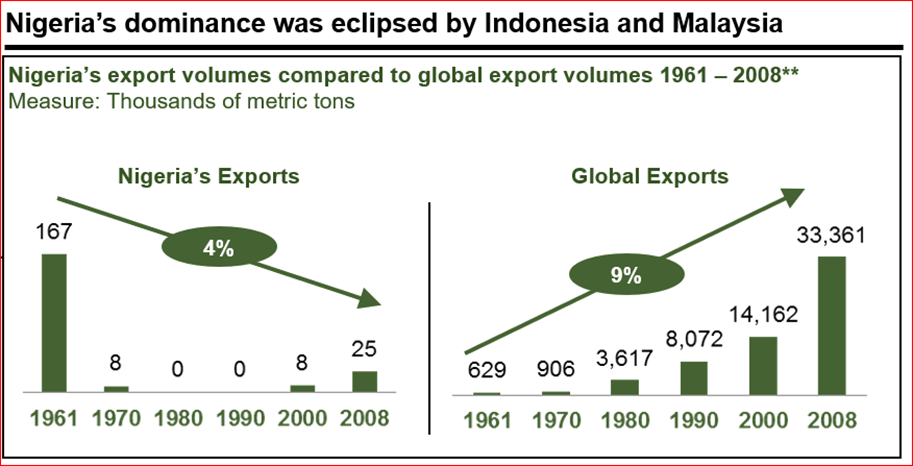 To summarize, from 1960 to 1965, Nigerian crude oil revenues to total revenues were zero. By 1970, Nigeria’s crude oil revenues as a share of total revenues jumped to 26%, but crude oil was sold at below $3 a barrel from 1960 to 1972. Also, in the same period, Nigeria’s palm oil exports fell from 167mt to 8mt, same for groundnuts, 502mt in 1961 to 291mt in 1970. By 1975, crude oil share was at 77%, but crude oil prices were $10 on average a barrel.
To summarize, from 1960 to 1965, Nigerian crude oil revenues to total revenues were zero. By 1970, Nigeria’s crude oil revenues as a share of total revenues jumped to 26%, but crude oil was sold at below $3 a barrel from 1960 to 1972. Also, in the same period, Nigeria’s palm oil exports fell from 167mt to 8mt, same for groundnuts, 502mt in 1961 to 291mt in 1970. By 1975, crude oil share was at 77%, but crude oil prices were $10 on average a barrel.
Crude oil did not eclipse palm oil. Instead, palm oil exports fell, and oil became the most significant contributor to revenues for Nigeria. The Central Bank of Nigeria is quoted as saying, “if Nigeria had maintained its market dominance in the palm oil industry, Nigeria would be earning approximately $20b annually from cultivation and process of palm oil as at today (2019)”.
If palm oil had continued to be exported, Nigeria would have earned from palm oil alone, the equivalent of the 2020 budgets of Lagos, all South East and the South-South States combined.
Crude oil is not the problem; the problem is how Nigeria has structured its fiscal federalism. I explain.
Below is the progression of the fiscal allocation formula.
1953 Sir Louis Chick: The penultimate revenue allocation formula for Nigeria was done by Sir Louis Chick.
Export duties were 50% to the State of origin of export.
1958 Raisman; Commissioner Raisman amended Sir Chick formula.
Export duties were 100% to the State of origin
1963 constitution….
Export duties maintained at 100% of the state of origin
1970 Decree no 13, the Military steps in. the States lose fiscal autonomy, maintain derivation. The Distributable pool was gone
1975, Decree 6: the military further reduced derivation to 20%,
1977, Aboyade Commission. The military created the Federation Account. Derivation abolished. Export duties are now 0% to the State of origin
Thus in 13 years, Nigeria took Regional/States share of export proceeds from 100% to 0%. Look at groundnut exports; they never recovered when States in the North lost the export revenues of agriculture after 1970.
There remains NO incentive for state governments in Nigeria to encourage agriculture. States own the land where the land is commercially farmed. Still, the companies that run commercial agriculture pay Corporate income taxes to the Federal Government (FGN) when the cash crops are exported. The states are left with nothing. The states receive a share of these taxes via Consolidated Revenue Fund, but not according to the derivation principle. During this period that states lost derivation right in the fiscal federalism framework that commercial agriculture crashed in Nigeria.
What did the Federal Government do with crude oil and non-oil export proceeds revenues? The FGN shared it back to the States and Local Government according to a formula. States got on average 32%, Federal 47%, LGAs 15% (*note there are statutory transfers to Ecology, Agric development, etc.)
Export and corporate income taxes remain 0% to states by derivation except for solid minerals like gold. This means states do not retain as revenue to their budgets the export duties on cash crops produced within their states like palm oil. They only get PAYE on worker salaries.
But wait, there is more;
That 31% the FGN shares to states, is it shared equally? No, the sharing formula is called the horizontal revenue allocation formula. The critical sharing heads are:
- Equality 45%,
- Population 25%, 3.
- Landmass 5%. Lets pause here
This means that just being a state in the federation with a high population guarantees 65% of the allocation to states from the federation purse.
The FGN took the mineral and non-oil export earning to a central account, retained 47% of that account, then returned 51% to the States and LGAs but determined it will be shared out based on “equality” and “population”… not derivation, i.e., where the income was generated. Thus all States now focus on their population figure, not agriculture. Population and “equality,” not exports or derivation, determine how states receive revenues from the 51% allocation.
Palm oil, for instance, can be farmed in 24 states in Nigeria, including Kaduna. Specifically in Abia, Akwa Ibom, Cross River, Rivers, Bayelsa, Imo, Anambra, Ebonyi, Enugu, Delta, Edo, Ondo, Ogun, Osun, Oyo, Ekiti, Benue Kwara, Kogi, Nassarawa, Plateau, Taraba, Adamawa, and Kaduna…but why should a state bother incentivizing the planting palm oil? If groundnut export revenues still went to Kano State 100% via derivation, there would still be groundnut pyramids in Kano today. Kano lost the export proceeds funds to FAAC, thus no incentive to support planting groundnuts by the State.
Solution?
Reward what you want to improve; if you wish for safer drivers, you reward drivers with zero car scratches. Unhook states from crude oil-funded FAAC by giving them a derivation share of their export proceeds from their agriculture cash crops. Return the states the fiscal principle of derivation on agricultural exports. That will mean states see a direct relationship between commercial farming and IGR, which will spur agriculture investment. Governors will seek out agriculture investors the same way and vigour they seek out Shoprite Malls.
If States retained even 13% derivation on income taxes and export duties on agricultural produce just as they enjoy with solid minerals, they would see the incentive to attract companies to come to their states and push non-oil exports.
Derivation on agriculture is also fair. All states have land; all states farm, graze or fish. Agriculture is still a significant contributor to Nigeria’s GDP growth, and it still employs millions of Nigerians. A fiscal amendment to give states even 13% export earning can have two massive impacts. In the short term, it makes agriculture attractive, and in the long term, it makes all states fiscally viable.
The problem with agriculture in Nigeria is not crude oil but Nigeria’s faulty fiscal federalism (FAAC).

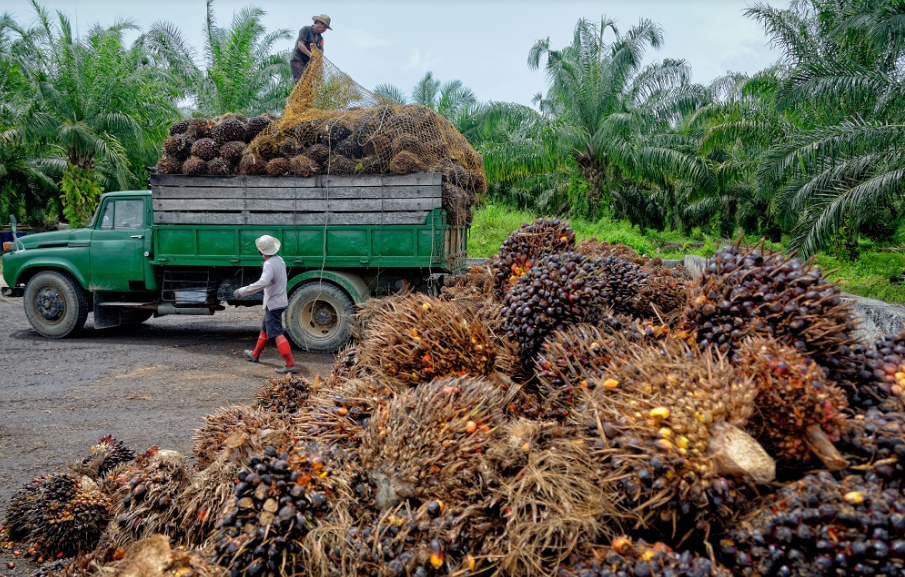



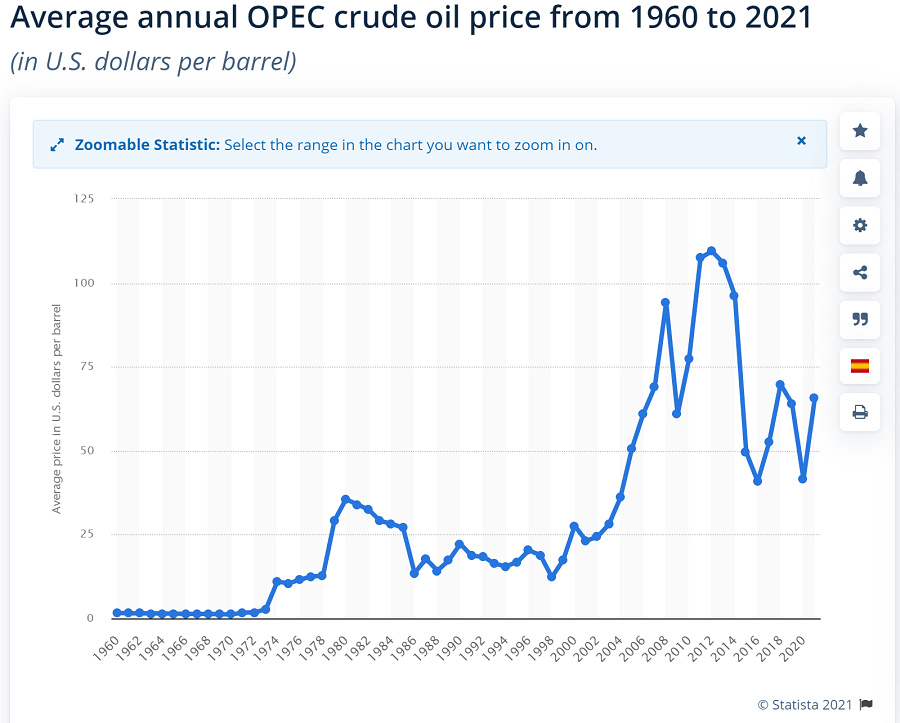
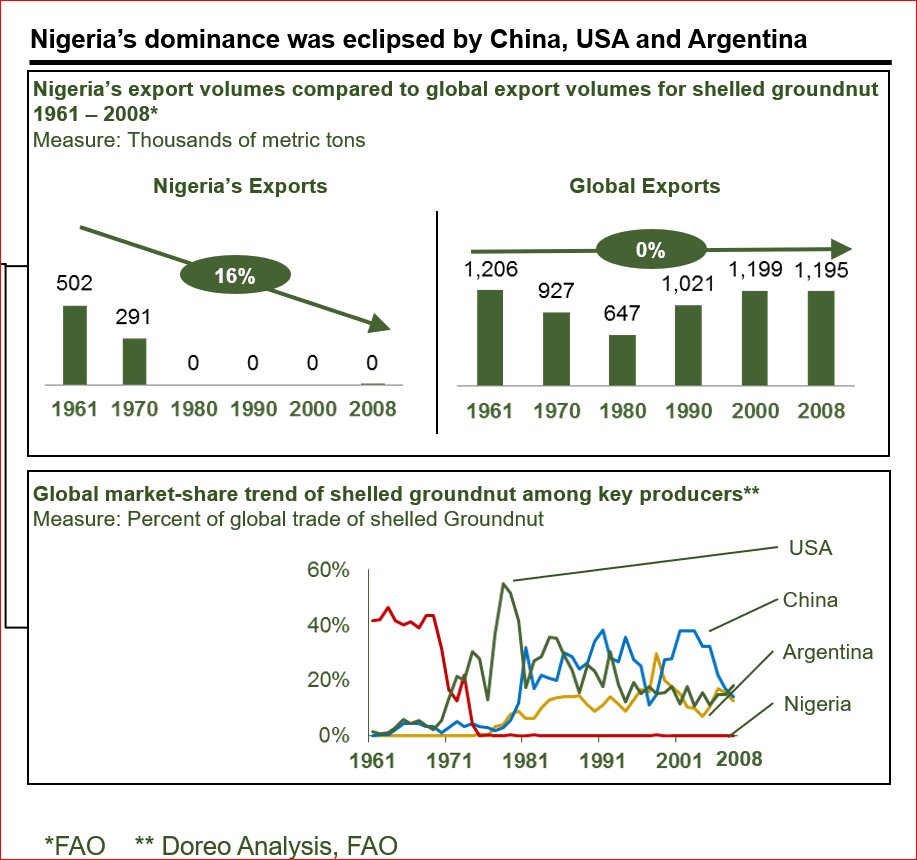














Thank you Nairametrics for making that clear. some of us thought crude oil was generating so much that the government of the day decided to abandoned agriculture. This article is beyond talk it has action plan. How I wish those in the corridors and seat of power can listen and apply. States benefiting will fight this but come’on we need to apply this for everybody to wake up. This article should be read in schools both secondary and tertiary. so we all know the root of the problem. Nigeria is underperforming. Thank you ! God Bless !
Perfect presentation for restructuring, lucid, logical , fact based.
Kudos Mr Kalu for an insightful article! So many people, including myself had held unto the assumption that crude oil distracted Nigeria from its enormous agricultural potential. This article points once again to the criticality of having the right people drawing out our policies – meritocracy. Policy (design, synergies and consistency) is probably the most critical area that Government can make impact. With the right moves, Government can incentive the deployment of resources needed to make progress. We don’t need to have public officials globetrotting in search of investors. They are actually already looking for promising destinations.